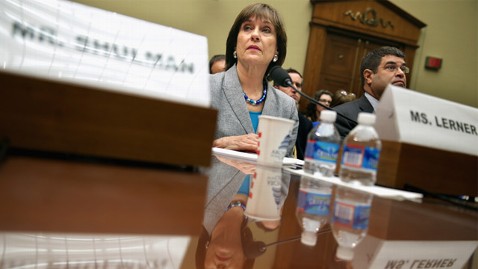IRS' Lois Lerner Takes Fifth, Shuns Congress

Image credit: Chip Somodevilla/Getty Images
Lois Lerner, the Internal Revenue Service's director of Exempt Organizations who is at the center of the controversy after the agency targeted conservative organizations for gratuitous scrutiny, invoked her Fifth Amendment right against self-incrimination today at a congressional hearing examining the scandal.
Lerner quietly took her seat at the witness table this morning, standing and raising her right hand as she swore to tell the truth alongside other senior IRS officials testifying at the hearing.
When it became her turn to speak, Lerner read a brief statement into the record, declaring her innocence.
"I have not done anything wrong," she said. "I have not broken any laws, I have not violated any IRS rules or regulations, and I have not provided false information to this or any other congressional committee."
Lerner then said that while she "would very much like to answer the committee's questions," her counsel advised her to assert her constitutional right not to testify or answer questions related to the subject matter of the hearing.
"Because I'm asserting my right not to testify, I know that some people will assume that I've done something wrong. I have not," she reiterated. "One of the basic functions of the Fifth Amendment is to protect innocent individuals, and that is the protection I'm invoking today."
Maryland Rep. Elijah Cummings, the top Democrat on the committee, entered into the record written answers that Lerner provided for the inspector general's investigation. Rep. Darrell Issa, the Republican chairman of the committee, said he had not seen the document and asked Lerner to authenticate her answers.
The document was passed the Lerner, who put on her glasses to skim through it.
"This appears to be my response," she said.
"So it's your testimony?" Issa of California asked. "As far as your recollection, that is your response?"
"That's correct," Lerner answered.
Republicans on the committee quickly interjected, challenging that Lerner gave up her right to remain silent and should be compelled to answer questions from members.
"She just testified. She just waived her Fifth Amendment right to privilege," Rep. Trey Gowdy, R-S.C., a former federal prosecutor, said, "You don't get to tell your side of the story and then not be subjected to cross-examination. That's not the way it works. She waived her right to Fifth Amendment privilege by issuing and opening statement. She ought to stand here and answer our questions."
Members of the public watching in the committee room applauded enthusiastically.
Issa continued to quiz Lerner, who then declined to answer any further questions.
"Is it possible that we could narrow the scope of questions and that there are some areas that you would be able to answer any questions on here today?" Issa asked.
"I will not answer any questions or testify today," she responded.
Issa followed up: "Ms. Lerner, would you be willing to answer questions specifically related to the earlier statements made under oath before this committee?"
"I decline to answer that question for the reasons I've already given," she deadpanned.
Issa then dismissed Lerner from the hearing, and she quickly left the committee room.
When reporters caught up to Lerner in a back hallway as she made her way to her vehicle, she was guarded by a handful of U.S. Capitol Police officers and her legal team, and she ignored questions from the media about her decision to take the Fifth.
The frustration over her silence was shared on both sides of the aisle. During the hearing, Rep. Stephen Lynch warned Lerner that her silence could compel Congress to appoint a special prosecutor to conduct an investigation.
"If this committee is prevented, by obstruction or by refusal to answer, the questions that we need to get to the bottom of this, you will leave us no alternative but to ask for the appointment of a special prosecutor or appointment to special counsel to get to the bottom of this," Lynch, D-Mass., said. "I hope that's not the approach of the IRS going forward because there will be hell to pay if that's the route that we chose to go down."
While the IG's report found that the scandal was not the result of political motivations, Issa criticized the IRS for failing to meet its objective as an independent agency.
"We knew then that something seemed to be wrong. We knew then that there was smoke. We knew then that, in fact, something just didn't seem to be right," he said. "Many people believe that the IRS is an independent agency. Nothing could be further from the truth."